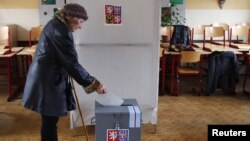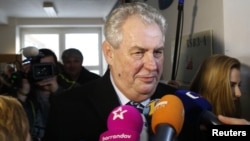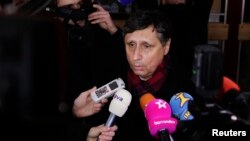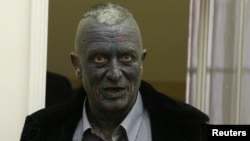BUDAPEST —
Citizens in the Czech Republic are voting in the first direct presidential elections in their nation's 20-year history. Among the three favorite candidates is the man who wants to become Europe's first popularly elected Jewish head of state and one unusually colorful candidate.
Two former Czech prime ministers, both ex-Communists, are expected to finish atop the list of nine first-round candidates -- including one with a fully tattooed face.
This is the first time a Czech president will be elected by popular vote. In the past they were chosen by the country's parliament.
Polls suggest outspoken leftist Milos Zeman is likely to come out ahead in the European Union nation of over 10 million people.
However Zeman, who is 68, is not expected to receive enough votes to clinch a first-round victory. He likely will face mild-mannered center-rightist Jan Fischer in a run-off vote on January 25 and January 26.
Fischer, whose father survived Auschwitz and other Nazi-death camps, could become Europe's first popularly-elected Jewish president.
Though his mother was Catholic, he says he feels he is part of the Jewish community due to his father's Holocaust experiences and a partly Jewish upbringing.
The largely ceremonial presidency would be the crown on a career for the ex-prime minister, who once ran the Czech Statistical Office and was vice president of the European Bank for Reconstruction and Development (EBRD).
Political commentators say the 62-year-old compensates for his lack of charisma simply by being "ordinary."
Fischer made that clear at a televised presidential debate on the eve of the two-day presidential poll.
"Voters will make the right choice because there are many wise people in this land." he said. "Don't be poisoned by the politicians, but make your own choice."
Fischer said the elections are not about the personality of candidates "but about you and the future of the country."
There is one surprise in this race as polls put the colorful Vladimir Franz in third place. The 53-year-old opera composer and painter is tattooed from head to toe. His face is a warrior-like mix of blue, green and red.
He says his tattoos "are not a handicap, they are added value."
Franz, who is a professor at Prague's school of performing arts, is not surprised about his popularity in the polls, despite a reported campaign budget of $26,508.
He says people are upset about politics because of widespread corruption.
"The political system is so enchanted with itself that it's lost the ability to self-reflect." he said. He added that Czechs are "fed up with this [crap.]"
The artist reminds Czechs of the late Vaclav Havel, the former dissident and playwright who became the Czech Republic's first president after it broke away from what was Czechoslovakia on January 1, 1993.
While Franz is not expected to receive the most votes, his support is seen as crucial to whoever wants to become president of a country faced with recession, austerity and corruption.
The new president would replace the euroskeptic Vaclav Klaus who was popular but has recently come under fire for his New Year's decision to release about 7,000 prisoners.
Some of those receiving amnesty have since returned to robbery and murder, prompting mayors of 600 municipalities to remove Mr. Klaus' photos from official buildings.
First official results of the Czech Republic's two-day presidential poll are expected late Saturday.
Two former Czech prime ministers, both ex-Communists, are expected to finish atop the list of nine first-round candidates -- including one with a fully tattooed face.
This is the first time a Czech president will be elected by popular vote. In the past they were chosen by the country's parliament.
Polls suggest outspoken leftist Milos Zeman is likely to come out ahead in the European Union nation of over 10 million people.
However Zeman, who is 68, is not expected to receive enough votes to clinch a first-round victory. He likely will face mild-mannered center-rightist Jan Fischer in a run-off vote on January 25 and January 26.
Fischer, whose father survived Auschwitz and other Nazi-death camps, could become Europe's first popularly-elected Jewish president.
Though his mother was Catholic, he says he feels he is part of the Jewish community due to his father's Holocaust experiences and a partly Jewish upbringing.
The largely ceremonial presidency would be the crown on a career for the ex-prime minister, who once ran the Czech Statistical Office and was vice president of the European Bank for Reconstruction and Development (EBRD).
Political commentators say the 62-year-old compensates for his lack of charisma simply by being "ordinary."
Fischer made that clear at a televised presidential debate on the eve of the two-day presidential poll.
"Voters will make the right choice because there are many wise people in this land." he said. "Don't be poisoned by the politicians, but make your own choice."
Fischer said the elections are not about the personality of candidates "but about you and the future of the country."
There is one surprise in this race as polls put the colorful Vladimir Franz in third place. The 53-year-old opera composer and painter is tattooed from head to toe. His face is a warrior-like mix of blue, green and red.
He says his tattoos "are not a handicap, they are added value."
Franz, who is a professor at Prague's school of performing arts, is not surprised about his popularity in the polls, despite a reported campaign budget of $26,508.
He says people are upset about politics because of widespread corruption.
"The political system is so enchanted with itself that it's lost the ability to self-reflect." he said. He added that Czechs are "fed up with this [crap.]"
The artist reminds Czechs of the late Vaclav Havel, the former dissident and playwright who became the Czech Republic's first president after it broke away from what was Czechoslovakia on January 1, 1993.
While Franz is not expected to receive the most votes, his support is seen as crucial to whoever wants to become president of a country faced with recession, austerity and corruption.
The new president would replace the euroskeptic Vaclav Klaus who was popular but has recently come under fire for his New Year's decision to release about 7,000 prisoners.
Some of those receiving amnesty have since returned to robbery and murder, prompting mayors of 600 municipalities to remove Mr. Klaus' photos from official buildings.
First official results of the Czech Republic's two-day presidential poll are expected late Saturday.







